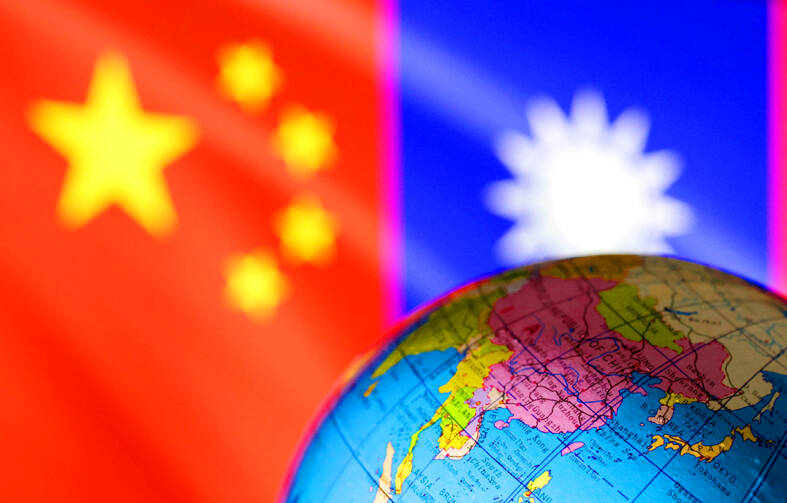Inter-Parliamentary Alliance on China (IPAC) members on Friday launched a campaign urging governments to assess the domestic economic effect of a shock in the Taiwan Strait.
The campaign, named “Operation Mist,” is aimed at compelling governments to admit that “cross-strait stability is in the domestic interests of nearly every country in the world,” IPAC said.
A war over Taiwan would result in a US$10 trillion shock to the world economy — about 10 percent of global gross domestic product, a report published by Bloomberg Economics showed.

Photo: Reuters
“No country will be immune from this economic fallout, which is likely to be at least five times worse than the economic damage caused by Ukraine,” the cross-national parliamentarian group said.
Ordinary people would have to bear the consequences if governments fail to de-escalate and deter a cross-strait conflict, it said, adding that “it behooves elected representatives worldwide to ensure this does not happen.”
“Operation Mist” was initiated by several cochairs and members of IPAC, including German member of the European Parliament Reinhard Butikofer, Dutch lawmaker Jan Paternotte, Australian Senator David Fawcett and French Senator Olivier Cadic.
Stewart Malcolm McDonald, a British lawmaker who is also an IPAC member, asked during a British parliamentary debate in January whether the UK government had conducted economic modeling on the potential impact of an economic blockade by China on Taiwan or a full-scale invasion.
British Minister of State for Indo-Pacific Trade Anne-Marie Trevelyan responded, saying that the government is focusing on how it can “build resilience in UK interests and support partners.”
Speaking to reporters, McDonald on Friday said he believed the British government had simulated various Taiwan Strait scenarios, but is unwilling to release the information.
Like some other British lawmakers, Macdonald said the British government should make its findings and conclusions public.

The CIA has a message for Chinese government officials worried about their place in Chinese President Xi Jinping’s (習近平) government: Come work with us. The agency released two Mandarin-language videos on social media on Thursday inviting disgruntled officials to contact the CIA. The recruitment videos posted on YouTube and X racked up more than 5 million views combined in their first day. The outreach comes as CIA Director John Ratcliffe has vowed to boost the agency’s use of intelligence from human sources and its focus on China, which has recently targeted US officials with its own espionage operations. The videos are “aimed at

STEADFAST FRIEND: The bills encourage increased Taiwan-US engagement and address China’s distortion of UN Resolution 2758 to isolate Taiwan internationally The Presidential Office yesterday thanked the US House of Representatives for unanimously passing two Taiwan-related bills highlighting its solid support for Taiwan’s democracy and global participation, and for deepening bilateral relations. One of the bills, the Taiwan Assurance Implementation Act, requires the US Department of State to periodically review its guidelines for engagement with Taiwan, and report to the US Congress on the guidelines and plans to lift self-imposed limitations on US-Taiwan engagement. The other bill is the Taiwan International Solidarity Act, which clarifies that UN Resolution 2758 does not address the issue of the representation of Taiwan or its people in

US Indo-Pacific Commander Admiral Samuel Paparo on Friday expressed concern over the rate at which China is diversifying its military exercises, the Financial Times (FT) reported on Saturday. “The rates of change on the depth and breadth of their exercises is the one non-linear effect that I’ve seen in the last year that wakes me up at night or keeps me up at night,” Paparo was quoted by FT as saying while attending the annual Sedona Forum at the McCain Institute in Arizona. Paparo also expressed concern over the speed with which China was expanding its military. While the US

SHIFT: Taiwan’s better-than-expected first-quarter GDP and signs of weakness in the US have driven global capital back to emerging markets, the central bank head said The central bank yesterday blamed market speculation for the steep rise in the local currency, and urged exporters and financial institutions to stay calm and stop panic sell-offs to avoid hurting their own profitability. The nation’s top monetary policymaker said that it would step in, if necessary, to maintain order and stability in the foreign exchange market. The remarks came as the NT dollar yesterday closed up NT$0.919 to NT$30.145 against the US dollar in Taipei trading, after rising as high as NT$29.59 in intraday trading. The local currency has surged 5.85 percent against the greenback over the past two sessions, central